#i feel like arguing whether joel was in the right is kinda missing the point
Explore tagged Tumblr posts
Text
I love stories about 'bad' people who still love and are loved. people who don't care if the people they love are bad. I love when the point isn't to say "you're not actually bad" but "even if you are, you still deserve love in your life"
#true neutrals are the best and i really want more of them in media#this is abt joel tlou (game specifically. i haven't watched the show)#we can argue all day about whether it was 'morally wrong' to kill the fireflies or whether their plan would have worked#but i love that he doesn't care if he's doing something terrible. all he cares about is her. and that gets to me#and that ellie absolutely knows he's lying to her but decides not to find out because she wants to be with him too#i feel like arguing whether joel was in the right is kinda missing the point#also don't get me wrong i love when the point is learning that you're not actually bad. those stories can also be wonderfully poignant.#my favorite character is one of those#but sometimes my messed up brain needs to hear 'you don't have to maintain 'good' to still be loved'
89 notes
·
View notes
Text
The Kissing Booth (2018)

I recognize the problems of The Kissing Booth. We've seen this plot so many times. Even if this take did put some spin on the familiar romance, it still wouldn’t be enough to call it even mildly original. You could also point to some problematic/dated story elements as proof that it's a bad movie. I know, but I kinda liked it.
Nothing could tear apart Shelly “Elle” Evans (Joey King) and her best friend Lee Flynn (Joel Courtney). Except maybe Lee’s older, handsome brother Noah (Jacob Elordi). Despite their friendship rules explicitly forbidding the dating of each others’ siblings, Elle can’t help herself.
Immediately, you can tell the story’s just too quirky for its own good. Elle and Lee were born at the same time. On the same day. Their mothers were best friends. Elle’s mom died when she was 11. Guess what? Lee’s mom (Molly Ringwald) didn’t hesitate to fill the gap. The pair are inseparable and love playing Dance Dance Revolution.
When Elle goes to school in a skirt and gets her behind slapped, Noah jumps to defend her honor. Yeah, he solves many problems by punching them but he’s so dreamy. It would be great if he wasn’t a womanizer but Elle's never been kissed. He’s just a bad boy that needs to be tamed/fixed/changed. Plus, he rides a motorcycle! Did I mention he has a football scholarship?
You know exactly where this is going. The only real surprise is whether Lee secretly pines for Elle or not. You’ll find out once we get to the titular, needlessly extravagant Kissing Booth. The thing’s got lights and a custom-made neon sign (Weren’t they using it to raise money, not spend it?). Here's where you might have a problem with the story. The boys/girls who line up are practically licking their lips while getting ready to pucker up with a hottie that would otherwise never give them the time of day. The idea of lesbian/gay students participating never comes up (the issue is “addressed” with a blink-and-you'll-miss-it moment). I can’t argue with you on that one. At least it’s a welcome change from the Mean Girls wannabee thing it was previously doing. This entire movie is barely functioning as an escapist fantasy for teenage girls. Even they know they shouldn’t like this but are tolerating it because the guy's handsome. Stick to the softened 50 Shades of Grey thing you've got going. ... I just talked myself out of the 3/5 I was going to give it.
So why was I even tempted to recommend The Kissing Booth? Two reasons. First, the ending. It hits the right amount of “ah, those were the days” sentiment and sweetness. Second, the actors. Joey King is quite charming and when she’s standing next to Jacob Elordi, you can feel the heat between them. Ultimately, it isn't enough. We may all be starving for a good romance but The Kissing Booth doesn't live up to our needs. (September 28, 2020)

#TheKissingBooth#movies#films#movieReviews#FilmReviews#VinceMarcello#BethReekles#JoeyKing#JoelCourtney#JacobElordi#MollyRingwald#2018movies#2018films
3 notes
·
View notes
Text
Dollhouse season one full review

How many episodes pass the Bechdel test?
92.3% (twelve of thirteen).
What is the average percentage per episode of female characters with names and lines?
46.83%
How many episodes have a cast that is at least 40% female?
Nine, over half (six of those were 50%+, one of them 60%).
How many episodes have a cast that is less than 20% female?
Zero.
How many female characters (with names and lines) are there?
Twenty-eight. Thirteen who appeared in more than one episode, six who appeared in at least half the episodes, and one who appeared in every episode.
How many male characters (with names and lines) are there?
Forty-two. Eleven who appeared in more than one episode, five who appeared in at least half the episodes, and three who appeared in every episode.
Positive Content Status:
Not good at all. The series is rife with violence against women and involves sexual assault on a constant basis, with acknowledgment or exploration of such inclusions intermittent and interlaced with excuses. Needless to say, it never even gets close to flirting with an above-average content rating (average rating of 2.76).
General Season Quality:
A mess. There are elements of good things here, and some episodes that utilise that potential, but mostly this is a show that doesn’t seem to know what it wants to do or how far it really wants to pursue its own promises, and it is full of dead air and extremely questionable storytelling, wrapped around one of the least-dynamic lead characters I’ve ever seen. It’s a recipe for failure, and a disappointing one at that, because done right, this could have been truly amazing.
MORE INFO (and potential spoilers) under the cut:

Let’s nail down how consent works, because it might be the most important issue at the heart of this show that the writers just don’t seem to understand: consent is not a binding contract. Real consent is
1. ongoing (may be revoked at any time if the individual in question wishes; must be re-established or renegotiated if the circumstances originally consented to change)
2. enthusiastic (if the individual becomes uncertain/uncomfortable with conditions, actions must halt until consent has been renegotiated and re-established)
3. informed (an individual cannot consent to terms that are obfuscated or omitted; consent gained through lies or trickery is not consent at all), and
4. willing (coerced consent - whether through threats, ultimatums, manipulation, or other means - is not real consent. If the individual is placed in a position where declining is not a viable safe option, they cannot give consent).
Pretty clear-cut, really. With that in mind, the only way that the Dollhouse could operate in an ethical manner would be if the dolls were genuine volunteers who were restored to their original personalities after every engagement, so that they could consider the requirements of each job as they arose and pick and choose which ones they were comfortable fulfilling; it would then also require that their imprinted personality include strict parameters agreed to beforehand to preserve their ability to revoke consent if their boundaries are violated. Of course, there would still be LOADS of ways for the technology to be abused, but that’s an irrelevant discussion in context, because that’s not how the Dollhouse operates. Many of the dolls are not willing participants from the outset, but even if they are, after being stripped of their personalities and memories they lose the power to make informed choices and their enthusiasm is all programmed in, and it’s irrelevant anyway because they are not presented the opportunity to give or deny consent in their ongoing situation. Whether or not the dolls can consent is not up for debate: by definition, plain and simple, they cannot. To suggest otherwise is kinda the same thing as when people say that marital rape isn’t a real thing, as if signing a marriage contract permits your spouse to override your bodily autonomy anytime they want. Consent can be fickle, subjective, and highly conditional, and those are all good things because they protect the basic human right to personal sovereignty. Consent is not a binding contract.
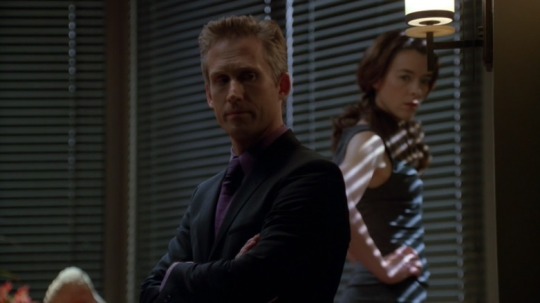
Despite occasionally throwing around lines about how ‘you can’t consent to being a slave!’, the show doesn’t want to commit to the idea that the dolls are, unequivocally, being abused, and the failure to be morally assertive on that point leads to some seriously reprehensible presentations, most notably in terms of rape. The oft-repeated lofty idea behind what (theoretically) makes the Dollhouse ‘good’ is that they give people ‘what they need’, which mostly means fulfilling sexual fantasies. Naturally, this makes all of the Dollhouse clients who acquire a doll for sexual purposes, rapists. They know that’s what they’re getting into, too, they know that they’re paying big bank to have a person brainwashed into fulfilling their desires, which by definition means that the person is being denied the capability to give consent. This isn’t a naughty secret being hidden from the client; it’s a known factor which they’ve decided they don’t care about. They’re ok with taking advantage of this person in order to fulfill their ‘need’. Thus, the fact that Joel Miner just wants to play house with an imprinted version of his dead wife is not cute or romantic, it’s still rape, but the show doesn’t treat it that way: it’s directly handled like we’re supposed to be happy that he gets what he wants, in the same episode as the writing finally bothers to dabble vaguely in the concept of consent issues after it turns out that Sierra has been raped by her handler (while NOT imprinted to think she wants it). Thus, the episode in question draws a straight parallel between the idea that there’s ‘real rape’ (what Hearn does), and then there’s innocent wish fulfillment (what Miner and anyone else who bothers to have their victim programmed first does), and we shouldn’t conflate the two. Except, obviously, we should conflate the two. Both are rape. There’s not a moral grey-scale here, that’s like arguing that if you drug someone first so that they can’t resist, that’s less assaultive than if they were cognizant enough to struggle. Both are rape, both disregard the bodily autonomy of the victim and deny them the right of choice. ‘But I really miss my dead wife!’ doesn’t make it better, and it certainly doesn’t make it ok. And giving people ‘what they need’ at the expense of others is not virtuous - especially when you factor in the price tag attached to a made-to-order sex slave.
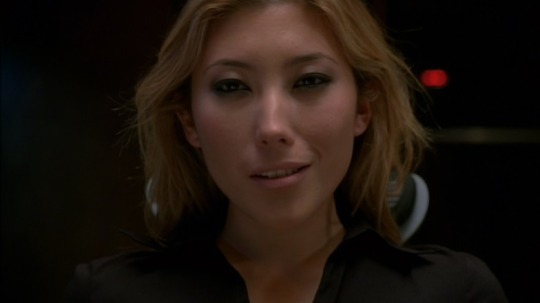
The above-referenced episode is one of the most egregious examples of this at play, but it’s a recurrent issue throughout the series, and not one that’s gonna go away. The story is not interested in analysing the fact that DeWitt has repeatedly raped Victor; her conflict about the issue revolves around the feeling that she - like the other Dollhouse clients - is pathetic for ‘needing’ programmed service. And while Ballard expresses misgivings about the idea of raping Mellie, he still does it, repeatedly, and there’s no condemnation from the narrative; we’re supposed to see this as a complication to Ballard’s moral compunctions, that he’s confronted with shades of grey in the black-and-white world he had imagined, but there are no shades of grey. You knowingly committed rape. More than once. The first time they had sex, when he didn’t know she was a doll? THAT is something Ballard can feel conflicted about, because he didn’t do it knowingly, he was not able to make an informed decision, his own ability to consent was impaired and he’s entitled to feel abused by the Dollhouse machinations that put him in that position. THAT is legitimate conflicted emotion. Going “fuck you, Dollhouse, you want to send me a sex slave, I’m gonna take out my conflicted emotions ON HER through what I readily recognise as rape”, that’s...not something a character can do and then still hang around on the show representing any kind of morality. That’s not even anti-hero material, that’s villainy, and if we respond to Hearn’s crimes by snapping his neck against a coffee table, why is Ballard still roaming around feeling righteous? The show is so sketchy on morality, it doesn’t even present Ballard’s attitudes as self-delusions, it isn’t exploring his descent into evil. Even from the first episode, it was unclear where the story really sat with Ballard, seeming simultaneously aware of the fact that he’s not as pure and heroic as he imagined himself, but also never pursuing the idea of exploring a more complex moral reality. If ‘now he’s a rapist but he feels bad about it (but not bad enough to NOT DO IT IN THE FIRST PLACE)’ is supposed to suffice as ‘deconstruction’, boy howdy, I got news. You can’t even pretend to deconstruct anything if you’re too busy equivocating to have an opinion in the first place.
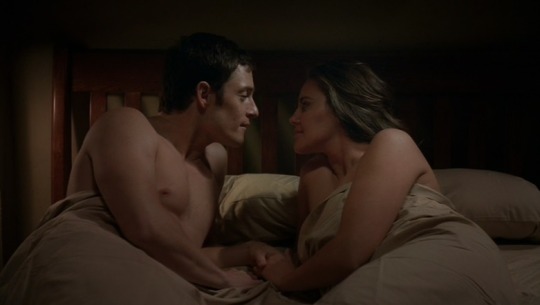
I’ve used this word so much already in relation to this show that it’s starting to lose its meaning, but what Dollhouse really suffers from is a misogyny problem. I touched on it already in the episode ‘Omega’ when I talked about how Alpha’s ruminations on the nature of the self/consciousness/etc are undercut by the intense misogyny of his character and story, because his presence in the narrative and his impact on other characters is so heavily tied up in the violent expression of his misogyny that there’s no room for a clear-minded discussion of anything else, and in truth the entire series suffers from the same affliction. Misogyny is so ubiquitous in the story at the same time as being so rarely acknowledged that they can’t engage meaningful thematic discussions about anything else; misogyny is the elephant in the room, and so much space is being dedicated to it, there’s nowhere to squeeze anything else in edge-wise. The refusal to acknowledge the clear-cut nature of consent and thereby the inherent sexual assault built into the frame work of the narrative is part of this, but it also represents an insidious division between ‘real misogyny’ and the various kinds that the show doesn’t want us to acknowledge, the many and sundry equivocations it is entertaining in order to avoid having a moral backbone. Alpha literally slicing up women’s faces is ‘real misogyny’ (by the writers’ definition), and a character like Nolan putting Sierra in the Dollhouse so that he can have force her to have sex with him is ‘real misogyny’ (quite contradictory since Nolan still has his doll programmed to want him, just like all the other clients; apparently it’s only rape if the perpetrator is a mustache-twirling cackling supervillain type). Tanaka slinging off about ‘whores’ is ‘real misogyny’ that Ballard can take umbrage with, but Ballard’s infantalising obsession with calling women ‘girls’? We’re not batting an eye. The fact that Echo is repeatedly engaged by one Matt Cargill, whose rape sexual fantasy is all about teaching a ditzy inexperienced girl new things? Cute! Echo being violently beaten in more than three-quarters of the episodes this season, sometimes multiple times per episode? Eh, that’s normal. That’s normal writing.
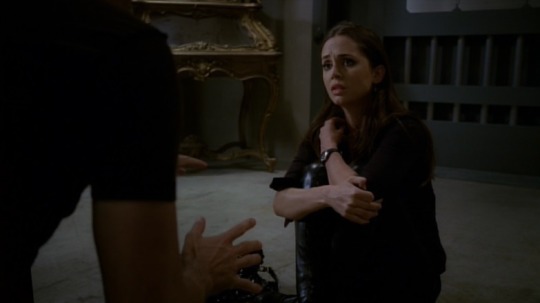
The ‘real misogyny’ is the stuff that the writing deems worthy of being called out, and like with the issue of creating a false grey-scale to excuse ‘softer’ rape crimes, this creates a situation in which more low-key misogyny can skate by unchecked because we’re being encouraged to view it comparatively, instead of objectively. If you’re talking about a violent serial rapist and you say “he calls women ‘girls’ all the time, too!”, it sounds like you’re being silly, because hello, there are much bigger problems to talk about. On the other hand, if you don’t sit around making softening comparisons, you can actually talk about how women being infantalised by men is a big problem that is part of a larger tapestry of misogyny, especially disturbing for the intersection with sexualisation (HUGELY at play with the dolls in their ‘doll state’), and relevant to the discussion of pedophilia (which, incidentally, the show featured TWICE in just thirteen episodes, but without any kind of exploration or commentary that would suggest an actual reason beyond the voyeuristic fetishisation of sexual violence which is this show’s bread and butter). Because the misogyny problem on this show is so all-encompassing (along with the rape-apologist grey morality, it is built into the framework of the series itself), the fact that it is never acknowledged and brought into the thematic conversation of the story blows a hole out the side of the writers’ ability to have any kind of sophisticated conversation about the morality of their subject matter: the combination of oblivious sexism and wanton avoidance leaves the moral compass of the story...nonexistent, really, smashed to pieces and rendered useless. It’s like they didn’t want to have to talk about the morality of the Dollhouse at all, they just wanted the narrative conceit of programmable people and the opportunity to indulge various objectifying fetishes, but since that’s not how storytelling works they figured they’d ramp up the ambiguity and pass off the lack of nuanced discussion as ‘shades of grey’, despite how inappropriate that is with sex trafficking. Thus, you get a show which treats “but if the perpetrator is sad, is it really rape?” like that’s a legitimate question.
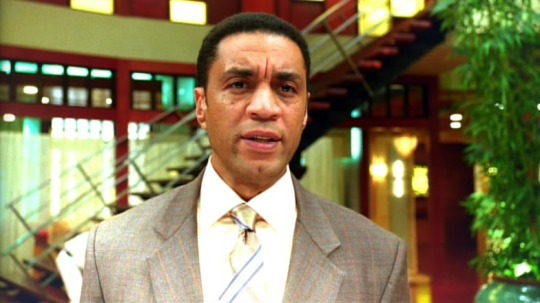
Honestly, we could unpack this show forever, because all of it needs unpacking, because it’s riddled and stained irrevocably with garbage in a way that is pervasive and complicated, but I’m gonna let this lie for now. We’ll talk about it all more as season two unfolds, and when I review that season’s developments and eventually, the full series (save me). There’s loads of stuff that I didn’t even touch yet, so at least I know I won’t be starved for content. I did know that, coming in, I knew it’d be an unhappy mess. The one thing that really surprised me about season one is how little the narrative actually discussed its own invoked themes, I thought they did better than that - perhaps season two will fill that void a bit. Maybe Echo will get hit in the fucking face less, too. I’m not gonna bet on that. After all, what would this show be without women turned into sex objects and then violently punished for it? Well. For starters, it would be better.
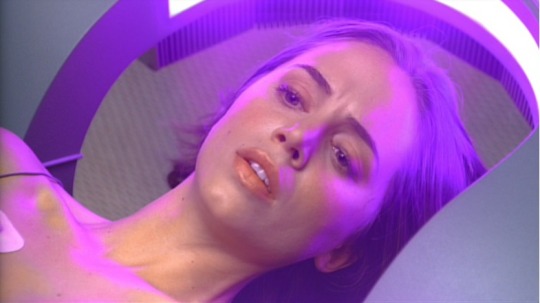
11 notes
·
View notes